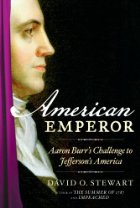American emperor: Aaron Burr’s challenge to Jefferson’s America
Burr had challenged Jefferson, his own running mate, in the presidential election of 1800. Indicted for murder in the dueling death of Alexander Hamilton in 1804, he dreamt huge dreams. He imagined an insurrection in New Orleans, a private invasion of Spanish Mexico and Florida, and a great empire rising on the Gulf of Mexico, which would swell when America’s western lands seceded from the Union. For two years, Burr pursued this audacious dream, enlisting support from the General-in-Chief of the Army, a paid agent of the Spanish king, and from other western leaders, including Andrew Jackson. When the army chief double-crossed Burr, Jefferson finally roused himself and ordered Burr prosecuted for treason.
The trial featured the nation’s finest lawyers before the greatest judge in our history, Chief Justice John Marshall, Jefferson’s distant cousin and determined adversary. It became a contest over the nation’s identity: Should individual rights be sacrificed to punish a political apostate who challenged the nation’s very existence? In a revealing reversal of political philosophies, Jefferson championed government power over individual rights, while Marshall shielded the nation’s most notorious defendant. By concealing evidence, appealing to the rule of law, and exploiting the weaknesses of the government’s case, Burr won his freedom.
Afterwards Burr left for Europe to pursue an equally outrageous scheme to liberate Spain’s American colonies, but finding no European sponsor, he returned to America and lived to an unrepentant old age.
Stewart’s vivid account of Burr’s tumultuous life offers a rare and eye-opening description of the brand-new nation struggling to define itself.

